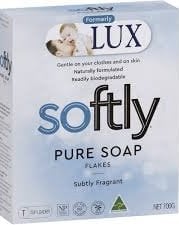Suffering from sensitive skin? Discover the crucial step you're missing after washing your clothes!
By
Danielle F.
- Replies 10
Living with sensitive skin can often feel like navigating a minefield, with everyday items potentially triggering discomfort and irritation. Among these daily challenges, laundry is a task that can unexpectedly turn your clothes, sheets, and towels into enemies of your skin. But fear not, as there are simple yet effective strategies to ensure your freshly washed items don't become a source of itchiness or soreness.
Karlie Suttie and Rachael Hallett, founders of the 'Mums Who' online community, which includes the popular Mums Who Clean Facebook group, have shared invaluable advice for those of us dealing with sensitive skin. Their insights are not just practical but can be easily incorporated into your laundry routine.
One of the most straightforward hacks they suggest is to perform an extra rinse cycle with your washing machine. If your machine has this function, adding an additional rinse can make a world of difference. 'This will ensure that your laundry comes out cleaner than ever and that there is no risk of residue,' Suttie and Hallett explain. Residual detergent is a common culprit for skin reactions, and an extra rinse helps to eliminate any leftover soap particles.
Another clever tip from these savvy mums is to give your clothes a quick tumble in the dryer after line drying them. While it might seem counterintuitive to dry something that's already dry, the goal here is to soften the fabric. Line-dried clothes can sometimes feel stiff, which might irritate sensitive skin. A brief stint in the dryer can make them feel more comfortable and gentle to the touch.
When it comes to laundry detergent, less is often more for those with sensitive skin. Suttie and Hallett recommend adhering strictly to the instructions on the detergent packaging to avoid using too much. They suggest using products like OMO sensitive capsules, which are pre-measured and easy to use, reducing the risk of detergent overuse.
Don't forget to wash new clothes, towels, and bedding before their first use. This practice helps to remove any residual chemicals or debris from the manufacturing process that could irritate your skin.
For households with members who work in dirty or chemical-laden environments, consider a separate washing machine to prevent cross-contamination. 'A second-hand machine can do the job, throw the dirty clothes in that machine instead,' they advise. This way, you can keep potential irritants away from the clothing and linens of those with sensitive skin.
Incorporating these tips into your laundry routine can make a significant difference in managing sensitive skin. Remember, it's not just about the products you use but also about the methods you employ. By taking these extra steps, you can ensure that your skin stays as comfortable and reaction-free as possible.
We'd love to hear from our Seniors Discount Club members about your own experiences and tips for dealing with sensitive skin and laundry. Share your stories in the comments below, and let's help each other live more comfortably!

And for those who want to stay updated on more tips and tricks for everyday life, don't forget to subscribe to our newsletter. Stay informed and enjoy a daily dose of practical advice tailored for you.
Karlie Suttie and Rachael Hallett, founders of the 'Mums Who' online community, which includes the popular Mums Who Clean Facebook group, have shared invaluable advice for those of us dealing with sensitive skin. Their insights are not just practical but can be easily incorporated into your laundry routine.
One of the most straightforward hacks they suggest is to perform an extra rinse cycle with your washing machine. If your machine has this function, adding an additional rinse can make a world of difference. 'This will ensure that your laundry comes out cleaner than ever and that there is no risk of residue,' Suttie and Hallett explain. Residual detergent is a common culprit for skin reactions, and an extra rinse helps to eliminate any leftover soap particles.
Another clever tip from these savvy mums is to give your clothes a quick tumble in the dryer after line drying them. While it might seem counterintuitive to dry something that's already dry, the goal here is to soften the fabric. Line-dried clothes can sometimes feel stiff, which might irritate sensitive skin. A brief stint in the dryer can make them feel more comfortable and gentle to the touch.
When it comes to laundry detergent, less is often more for those with sensitive skin. Suttie and Hallett recommend adhering strictly to the instructions on the detergent packaging to avoid using too much. They suggest using products like OMO sensitive capsules, which are pre-measured and easy to use, reducing the risk of detergent overuse.
Don't forget to wash new clothes, towels, and bedding before their first use. This practice helps to remove any residual chemicals or debris from the manufacturing process that could irritate your skin.
For households with members who work in dirty or chemical-laden environments, consider a separate washing machine to prevent cross-contamination. 'A second-hand machine can do the job, throw the dirty clothes in that machine instead,' they advise. This way, you can keep potential irritants away from the clothing and linens of those with sensitive skin.
Incorporating these tips into your laundry routine can make a significant difference in managing sensitive skin. Remember, it's not just about the products you use but also about the methods you employ. By taking these extra steps, you can ensure that your skin stays as comfortable and reaction-free as possible.
We'd love to hear from our Seniors Discount Club members about your own experiences and tips for dealing with sensitive skin and laundry. Share your stories in the comments below, and let's help each other live more comfortably!
Key Takeaways
- For individuals with sensitive skin, taking extra care with laundry practices can prevent irritation from clothes, sheets, and towels.
- Adding an extra rinse to the washing cycle and using the dryer to soften garments are suggested methods to reduce the likelihood of skin reactions.
- Following laundry detergent instructions precisely and considering gentle or hypoallergenic options like OMO sensitive capsules can also help.
- Washing new fabrics before use and potentially using a second washing machine for heavily soiled items are recommended to avoid contact with irritating substances.









